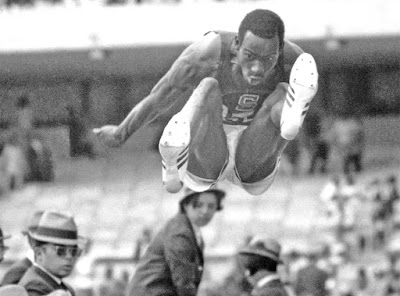The year 1968 was filled with monumental events that shaped American and world history. From the assassinations of Martin Luther King Jr. and Robert Kennedy to the Tet Offensive in the Vietnam War, it was a year of both triumphs and tragedies. In the midst of this turmoil, Bob Beamon made his mark on history by breaking the long jump world record at the 1968 Summer Olympics.
On October 18, 1968, Beamon took to the Estadio Olímpico Universitario in Mexico City for the long jump event. Despite misjumping on two of his qualifying attempts, he adjusted his approach and made it to the finals. It was there that Beamon went "unprecedentedly airborne," leaping 8.90 m (29 ft 2.5 in) and breaking the world record by an incredible 55 cm (1 ft 9 in).
Beamon's record-breaking performance was remarkable not only for the distance he jumped but also for the manner in which he achieved it. The long jump record had been broken or tied 15 times between 1901 and 1968, with incremental progress being the norm. The most the record had been broken by in any single jump was just 15 cm (approx. 6 in). Beamon shattered that trend by breaking the record by an unprecedented 55 cm.
The fact that Beamon was an American unfamiliar with the metric system only added to the drama of the moment. After seeing his record-breaking result displayed on the stadium's scoreboard, Beamon had no idea what he had just accomplished. It was only after his teammates informed him of his feat that he suffered a cataplectic attack and fell to his knees.
Beamon's performance at the Olympics was the culmination of a year of remarkable achievements. He had won 22 of the 23 competitions he entered in 1968, including setting a career best of 8.33 m (27 ft 4 in) and a theoretical world record of 8.39 m (27 ft 6.5 in) before the Olympics. While the latter was ineligible for record-keeping due to favorable wind conditions, it was a sign of the greatness to come.
Beamon's long jump record would stand for almost 23 years, a testament to the remarkable nature of his achievement. It took another record-breaking performance by Mike Powell at the 1991 World Championships in Tokyo to finally surpass Beamon's mark. Powell's record of 8.95 m (29 ft 4.36 in) remains the high-water mark in the discipline to this day.
But what Beamon accomplished in 1968 was more than just a record-breaking performance. It was a moment of mutation, a skipped link in the expected chain of progression. Nobody had ever taken flight like Bob Beamon before 1968, and it's safe to say no one ever will again. His legacy lives on, not only in the history books but also in the hearts and minds of those who witnessed his extraordinary achievement.
Source: Guinness World Record

No comments:
Post a Comment